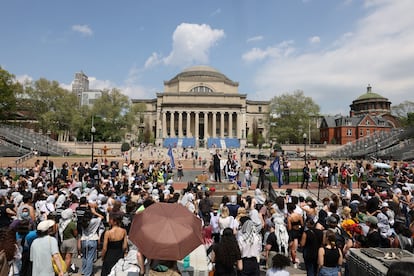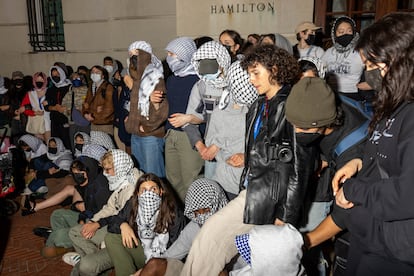Gaza protests at US universities deepen divisions among Democrats
The breakdown in negotiations between Columbia administrators and student representatives has exacerbated a phenomenon sweeping higher education centers in the United States

The breakdown in negotiations between the authorities at Columbia University in New York and representatives of the students who have been camped on the premises for the past 10 days in solidarity with Gaza — and who on Monday received an order to clear the encampment — has exacerbated a phenomenon sweeping higher education centers in the United States. The protests, which were initiated at Columbia and quickly spread to other universities from coast to coast, is reminiscent of the outcry against the Vietnam War and, as those protests did in 1968, it is now affecting the political sphere. Pressure has come not only from Republican members of Congress — the Speaker of the House, Mike Johnson, visited the campus last week in support of Jewish students — but also from some Democrats ahead of the presidential election in November, with the protests threatening to cost President Joe Biden even more support at the polls: 21 Democratic representatives have called on Columbia to dismantle the encampment, while other members of the party have shown solidarity with the students. In addition to the external front of criticism over Biden’s support for Israel from tens of thousands of voters of Arab and Muslim origin in March’s Super Tuesday primaries, the rift in the Democratic ranks threatens a new vote drain in November. In the early hours of Monday morning into Tuesday, Columbia students occupied a building, Hamilton Hall, after school administrators began suspending students who refused to leave the encampment.
The division among Democrats has again become apparent. The coalition of congressional representatives addressed a letter to Columbia’s board of trustees Monday to demand the dismantling of the encampment or the resignation of the university’s president, Nemat Shafik. The letter represents an escalation in the politicization of the protests, given that calls to restore order were so far limited to Republicans. The signatories expressed their “disappointment that, despite promises to do so, Columbia University has not yet disbanded the unauthorized and impermissible encampment of anti-Israel, anti-Jewish activists on campus.” The lawmakers are moderate or centrist members of Congress, 10 of whom are Jewish.
With the House set to vote this week on at least one measure against antisemitism that has further divided Democrats, another small group of the progressive faction, with representatives of the so-called Squad leading the way, are visiting campuses to support the protesters. Alexandria Ocasio-Cortez and Jamaal Bowman were at Columbia last Friday. Ilhan Omar last week visited the University of Minnesota and then Columbia, where her daughter was arrested in the early stages of the protests.
Whether or not to resort to forcibly evacuating campuses — with just two weeks until graduation ceremonies — is the main question facing the academic authorities and a reflection of political decisions. A hundred riot police cleared the University of Texas last week in a show of force by the state’s governor, Republican Greg Abbott. Columbia, which has its own law enforcement service and even has “demonstration management” employees, has so far resisted calling in the police again, as it did 10 days ago to suppress the first encampment — the repression of which sparked the nationwide movement — but each fresh day of protests is adding to the disaffection of donors, especially Jewish ones. Some of the Democratic congress members who signed the letter last week visited a center for Jewish students on campus funded by billionaire Robert Kraft, who is threatening to withdraw his financial support if the mobilization continues.

Divestment, a key demand
A few hours before delivering the eviction ultimatum on Monday, Columbia announced that it will not divest from companies linked to Israel, which is the main demand of the protesters along with the readmission of expelled students and a ceasefire in Gaza. By mid-2023, the elite New York university had some $13.6 billion invested in companies linked to Israeli capital, more than double the annual budget of the public City University of New York (CUNY), where a massive encampment has also sprung up, although that one is attracting no media attention.
Aside from the difficult balance between guaranteeing the exercise of freedom of expression for the protesters and suppressing the alleged antisemitic speeches that many Jewish students claim to hear on a daily basis, university administrators must attend to several other interests, such as the billions of donor dollars that finance the centers and their own investments. Columbia’s communiqué announcing that it will not divest from companies linked to Israel instead offers to invest in health and education in Gaza.
Many are already referring to the wave of protests as Biden’s Vietnam, a massive, cross-cutting mobilization with a global banner: Palestine. The only precedent, from the point of view of student demands, may be the protests against apartheid in South Africa that shook U.S. universities and, in the case of Columbia in 1985, twisted officials’ arms and resulted in the divestment of approximately 4% of the university’s portfolio in major companies. The mobilizations against the Iraq war were notable, but much less vociferous. Unlike more recent movements, such as Occupy Wall Street or Black Lives Matter, which were more locally rooted, solidarity with Gaza acts as a global dragnet: students, but also countless leftist and anti-globalization groups, have joined forces in thumbing their noses at the authorities and, above all, the two establishment parties. The bête noire that elite universities represent for Republicans, who attack them as a bastion of the radical left, has become the target of fiery discourse in this new front of the culture wars in the United States.
Columbia was hoping Monday for a last-minute miracle to avoid a repetition of the scenes of two weeks ago, when it brought in the police to dismantle the first encampment, resulting in around 100 arrests. It was precisely that repression that triggered a wave of protests across the U.S., leading to some 800 arrests — more than 300 of them over the weekend — such as those at USC in Los Angeles. The students show no sign of planning to up sticks: at Yale, where 50 people were arrested a week ago, a new encampment sprouted on Monday night. The university, meanwhile, began suspending students who refused to dismantle the protest camp.
Sign up for our weekly newsletter to get more English-language news coverage from EL PAÍS USA Edition
Tu suscripción se está usando en otro dispositivo
¿Quieres añadir otro usuario a tu suscripción?
Si continúas leyendo en este dispositivo, no se podrá leer en el otro.
FlechaTu suscripción se está usando en otro dispositivo y solo puedes acceder a EL PAÍS desde un dispositivo a la vez.
Si quieres compartir tu cuenta, cambia tu suscripción a la modalidad Premium, así podrás añadir otro usuario. Cada uno accederá con su propia cuenta de email, lo que os permitirá personalizar vuestra experiencia en EL PAÍS.
¿Tienes una suscripción de empresa? Accede aquí para contratar más cuentas.
En el caso de no saber quién está usando tu cuenta, te recomendamos cambiar tu contraseña aquí.
Si decides continuar compartiendo tu cuenta, este mensaje se mostrará en tu dispositivo y en el de la otra persona que está usando tu cuenta de forma indefinida, afectando a tu experiencia de lectura. Puedes consultar aquí los términos y condiciones de la suscripción digital.








































